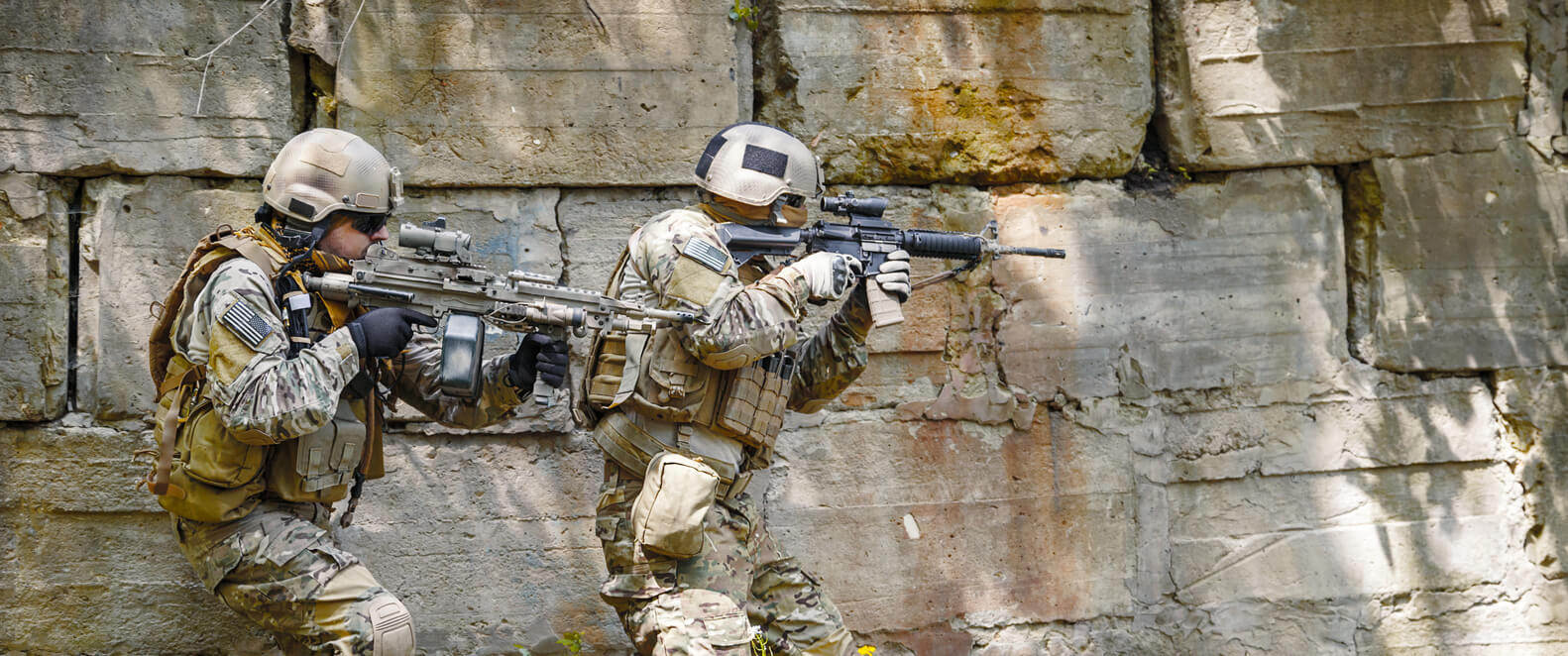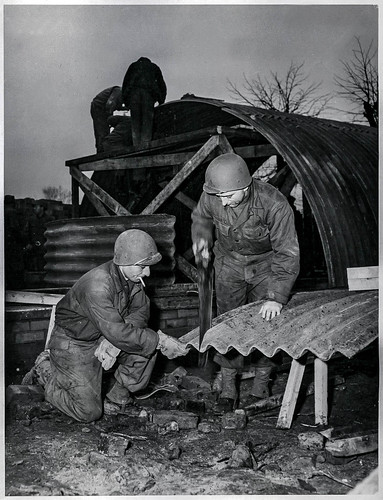Access Free VA Claims Assistance

Free Cancer Guide for Veterans

Find a Top Mesothelioma Doctor

Army veterans with service-related mesothelioma can file VA claims for 100% disability compensation and free treatment. Army veterans are at high risk of military asbestos exposure, which can cause mesothelioma and other asbestos-related diseases.

Mesothelioma is a rare and aggressive cancer that primarily occurs in the lining of the lungs and abdomen. Inhaling or ingesting asbestos fibers is the primary cause of mesothelioma. Occupational exposure is the most common type of asbestos exposure and the US Department of Veterans Affairs recognizes a number of military occupations as high risk.
The military heavily used asbestos-containing products for the mineral’s heat-resistant properties. While no longer used, older equipment and facilities may still contain asbestos.
“When I was diagnosed with mesothelioma it made me realize the disproportionate number of veterans who develop cancer compared to their civilian counterparts. Based on the statistics we see now, we need to make sure veterans are being screened for these different problems.”Col. Doug ThomasU.S. Army
Early detection and treatment of mesothelioma is essential. US Army veterans with occupational asbestos exposure should be screened for asbestos-related diseases. The VA can provide screening, treatment and disability compensation for veterans with service-connected mesothelioma.
Veterans’ family members may also have experienced secondary asbestos exposure from asbestos fibers carried on gear, shoes and clothing. Older military housing may also still contain asbestos products that can be hazardous if deteriorating or disturbed.
Mesothelioma has a long latency period and may not develop until 20-60 years after the asbestos exposure occurred. All Army veterans exposed to asbestos are at risk of developing mesothelioma in their lifetime.
Although use was largely discontinued in the 1970s, legacy asbestos in old equipment and materials pose an ongoing risk of exposure. Asbestos was widely used in construction materials on Army bases, including base housing. Exposure can also occur during deployments where asbestos is still in active use or where older asbestos-containing buildings are damaged.
If a veteran is diagnosed with mesothelioma and has a history of military asbestos exposure, then they may qualify for VA benefits with a 100% disability rating. VA benefits are available for veterans with a service-connected disability as well as those with financial need.
If you have mesothelioma that is not connected to your military service, you may still qualify for treatment at a VA mesothelioma treatment center. A patient advocate with VA-accreditation can help you navigate the complexities of this process.
VA benefits can include medical care as well as VA disability compensation. There are additional compensation benefits for veterans with service-connected conditions who are married or have dependent children. Veterans or family members with special needs may also be eligible for additional benefits. Benefits for family members continue after the veteran’s death.
To determine your eligibility and receive benefits, you must file a claim with the VA. Filing a VA claim for asbestos-related diseases requires filling out multiple forms, providing your military medical records and service records, proving military asbestos exposure and providing supporting medical information. Claims agents such as the patient advocates at The Mesothelioma Center work with Veteran Service Officers and veterans, providing expert assistance in navigating the daunting claims process.
“It’s so important for veterans to see a medical specialist who understands military exposure and to connect with people who understand VA benefits and can help you file your claims.”Former U.S. Army Capt. Aaron MunzVA-accredited claims agent and director of the Veterans Department at The Mesothelioma Center
In addition to providing help filing VA claims, our VA-accredited claims agents connect veterans with other medical, financial and legal resources. Our goal is to help veterans with mesothelioma get the best possible care and support.
Access Free VA Claims Assistance

Free Cancer Guide for Veterans

Find a Top Mesothelioma Doctor

The U.S. government cannot be sued for military asbestos exposure, but manufacturers can be sued if they produced asbestos products for the military. On average, out-of-court settlements for mesothelioma range from $1 – $2 million, while verdict amounts tend to be higher.
Lawsuits have been brought against companies involved in producing asbestos and products that contain asbestos. Some individual mesothelioma lawsuits have resulted in settlements of more than $4 million for military veterans.
While many Army veterans have successfully filed legal claims for asbestos exposure, each case is different. These results are not guaranteed. The experts at The Mesothelioma Center can advise you on what you can expect from working with experienced asbestos law firms to file a legal claim.
There are many potential sources of asbestos exposure from serving in the Army. Military vehicles, equipment and buildings made with asbestos-containing materials — including barracks and base housing — can all be sources of asbestos exposure. Additionally, soldiers deployed to combat zones can be exposed to asbestos from damaged or demolished buildings made with asbestos-containing materials.

Building construction or demolition can lead to exposure to asbestos found in older flooring, roofing, wiring, insulation, pipes and cement. Vehicle brakes and clutches can contain asbestos, leading to exposure for those servicing those vehicles. Working with high-temperature equipment, such as boilers, can expose individuals to asbestos used as insulation.
The risk of asbestos exposure in the Army can vary based on your military occupational specialty. It can also depend on the specific types of work you performed and the asbestos products used in those tasks.
Building construction, maintenance and demolition, for example, have high risks of asbestos exposure if buildings or building materials were produced in the 1970s or earlier. Individuals working in motor pools or performing vehicle maintenance were frequently – and still can be – exposed to asbestos from brake pads and clutches made with asbestos.
Directly working with asbestos-containing materials has a high risk of exposure. Anyone with primary asbestos exposure can be a source of secondary asbestos exposure for those they live with. Working or living in buildings with asbestos can also lead to exposure.
The Army, like other military branches, used asbestos extensively until the mid-1970s. Building materials and automotive parts are primary asbestos-containing products the Army used.
Even if you served after the 1970s, older Army buildings and equipment still exist that contain asbestos. Exposure to asbestos will be an ongoing concern for service members and veterans for decades to come.
Secondary asbestos exposure occurs when asbestos fibers are carried on clothing, shoes, hair, skin or equipment. If you experienced military occupational exposure to asbestos, then anyone you lived with at the time of your exposure was at risk of secondary exposure. This can include family members, roommates or other soldiers.
Additionally, indirect asbestos exposure can occur among coworkers sharing the same workspace. The U.S. Agency for Toxic Substances and Disease Registry explains working with someone with primary asbestos exposure can put you at risk for secondary exposure.
“Secondary exposure occurred when people who did not work directly with asbestos were nevertheless exposed to fibers as a result of sharing workspace where others handled asbestos,” ATSDR explains. “For example, electricians who worked in shipyards were exposed because asbestos was used to coat the ships’ pipes and hulls [Pan S et al. 2005].”

We can help you or a loved one file asbestos-related VA claims and access potential benefits.
Get Help NowBecause of the high rate of mesothelioma among veterans, the VA health care system has partnered with some of the best mesothelioma doctors in America. VA health care is affordable for low-income veterans and the VA provides free treatment for diseases connected to military service.
VA medical centers specialize in providing medical care and support for veterans. Some hospitals in the VA health system are specialized mesothelioma treatment centers. They have doctors and other health professionals with experience treating veterans with mesothelioma. The top VA treatment centers for mesothelioma are located in Boston, Los Angeles, Miami and Houston.
Five VA medical centers provide specialized mesothelioma care for veterans across the country. VA medical centers are often associated with other hospitals, including world-renowned research and teaching hospitals, providing the best possible mesothelioma care for veterans.

1400 VFW Pkwy West Roxbury, MA 02132
Year Built: Established in 1996
Number of Beds: 539 beds

11301 Wilshire Blvd Los Angeles CA 90073
Year Built: 1977
Number of Beds: 716 beds
For those veterans with mesothelioma who do not live close to one of these VA hospitals, the VA reimburses travel expenses for covered medical care. Additionally, many offer telehealth services to provide care to veterans remotely.
Mesothelioma doctors include surgeons, oncologists and other specialists. VA doctors treating veterans diagnosed with mesothelioma across the country have years of experience. They’re leaders in research and advanced techniques to treat veterans with this rare cancer.

Los Angeles, California
Pleural Specialist | Thoracic Surgery
Expertise: Pleurectomy and Decortication, Clinical Trials
Languages: English, Spanish, Vietnamese

Free Medical Care Archived 5/15/18
Pleural Specialist | Thoracic Surgery
Expertise: Pleural Mesothelioma Lung Cancer Video-Assisted Thoracoscopic Surgery Pleurectomy and Decortication Surgery
Languages: English, Spanish, Hebrew, Arabic

Franklin, Tennessee
Pleural Specialist | Thoracic Surgery
Expertise: Chest Wall Resection Immunotherapy
Languages: English
In addition to treating veterans with mesothelioma, specialists can confirm a diagnosis for those not yet diagnosed or suspect they’ve been misdiagnosed. A second opinion and early diagnosis can extend patients’ lives.
Recommended ReadingStay up-to-date on treatment, research, clinical trials, doctors and survivors
The information on this website is proprietary and protected. It is not a substitute for professional medical advice, diagnosis or treatment. Any unauthorized or illegal use, copying or dissemination will be prosecuted. Please read our privacy policy and terms of service for more information about our website.
This website and its content may be deemed attorney advertising. Prior results do not predict a similar outcome.
The Mesothelioma Center’s claim as the most trusted resource is based on our more than 150 5-star Google and BBB reviews. Our organization also helps more than half of all mesothelioma patients annually diagnosed.
Your web browser is no longer supported by Microsoft. Update your browser for more security, speed and compatibility.
If you are looking for mesothelioma support, please contact our Patient Advocates at (855) 404-4592
The Mesothelioma Center at Asbestos.com has provided patients and their loved ones the most updated and reliable information on mesothelioma and asbestos exposure since 2006.
Our team of Patient Advocates includes a medical doctor, a registered nurse, health services administrators, veterans, VA-accredited Claims Agents, an oncology patient navigator and hospice care expert. Their combined expertise means we help any mesothelioma patient or loved one through every step of their cancer journey.
More than 30 contributors, including mesothelioma doctors, survivors, health care professionals and other experts, have peer-reviewed our website and written unique research-driven articles to ensure you get the highest-quality medical and health information.
My family has only the highest compliment for the assistance and support that we received from The Mesothelioma Center. This is a staff of compassionate and knowledgeable individuals who respect what your family is experiencing and who go the extra mile to make an unfortunate diagnosis less stressful. Information and assistance were provided by The Mesothelioma Center at no cost to our family.LashawnMesothelioma patient’s daughter


Munz, A. (2026, February 10). Army Veterans With Mesothelioma. Asbestos.com. Retrieved February 24, 2026, from https://www.asbestos.com/veterans/army/
Munz, Aaron. "Army Veterans With Mesothelioma." Asbestos.com, 10 Feb 2026, https://www.asbestos.com/veterans/army/.
Munz, Aaron. "Army Veterans With Mesothelioma." Asbestos.com. Last modified February 10, 2026. https://www.asbestos.com/veterans/army/.
A United States military veteran with knowledge of asbestos exposure reviewed the content on this page to ensure it meets current standards and accuracy.

Retired Culinary Specialist and Senior Chief Nathan Pinner uses his extensive naval leadership, including service at the White House, to better serve other veterans.
Our fact-checking process begins with a thorough review of all sources to ensure they are high quality. Then we cross-check the facts with original medical or scientific reports published by those sources, or we validate the facts with reputable news organizations, medical and scientific experts and other health experts. Each page includes all sources for full transparency.
Please read our editorial guidelines to learn more about our content creation and review process.
